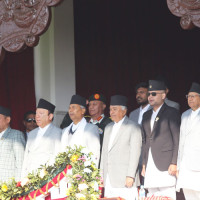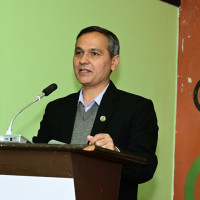- Monday, 15 December 2025
Cardamom exports hit record of Rs. 8.27 billion in FY 2022/23
By Laxman Kafle,Kathmandu, Aug. 13: Even though the overall export trade has shrunk significantly, large cardamom has made a remarkable jump in its export in the last fiscal year 2022/23.
According to annual trade statistics of the Department of Customs, the export of cardamom, one of the major exportable items, has reached around Rs. 8.27 billion during the last fiscal year 2022/23. This is the highest-ever export of cardamom from Nepal.
The export of cardamom increased by 72 per cent in the last fiscal year 2022/23 as compared to previous fiscal year 2021/22.
Cardamom worth Rs. 4.81 billion was exported during the previous fiscal year 2021/22. Raj Kumar Karki, former president of the Large Cardamom Entrepreneurs’ Association of Nepal, said that the most cardamom was exported in terms of value and quantity in the last fiscal year.
Around 10,000 tonnes of cardamom were exported in the last fiscal year while about 5,367 tonnes of cardamom had been exported in the fiscal year 2021/22. Similarly, around 8,843 tonnes of cardamom worth Rs. 7.02 billion had been exported in the fiscal year 2020/21 and 5,012 tonnes worth Rs. 3.90 billion in the fiscal year 2019/20.
About 5,240 tonnes of cardamom worth Rs. 4.27 billion had been exported in the fiscal year 2018/19. In the last fiscal year, cardamom export from Nepal occupied firth position.
The overall export of the country has decreased by 21.44 per cent to Rs. 157 billion during the last fiscal year.
However, cardamom occupies first place among the agricultural goods being exported from Nepal.
Large cardamom is exported to India and then to other countries. So, there are huge possibilities and opportunities to be exploited. Large cardamom occupies an important place in Nepal’s foreign trade.
As the price of cardamom has gone up along with the increase in production, the trade has been better than expected, said traders.
“Increase in cardamom production and in its price are the main reasons behind improvement in cardamom exports in the last fiscal year,” said Karki, who is also executive member of Federation of Nepalese Chambers of Commerce and Industry.
The cardamom production increased by 20 per cent to 7,000 tonnes in the last fiscal year compared to the previous fiscal year, he said. About 5,500 tonnes of cardamom were produced in the last fiscal year 2021/22.
He said that due to the increase in price, the export volume of cardamom increased last year when farmers and traders sold the stocked cardamom of the previous year.
Generally, farmers sell cardamom when the price rises and store it when the price falls.
Farmers sold a kilogram of cardamom at Rs. 900-1,500 based on quality last year which was limited to Rs. 700 a kilo in the previous year.
Due to the fall in prices, about 25-30 per cent of the cardamom produced in the previous fiscal year was stored by the farmers.
Karki said that the price of cardamom produced in Nepal has gone up with the increase in demand for cardamom in India. Due to this, the farmers involved in this sector are happy, he told The Rising Nepal.
As most of the cardamom produced in Nepal is exported to India, the price will fluctuate according to the Indian market. Nepal largest producer of large cardamom
Nepal is first in terms of production of large cardamom in the entire world, Karki said. According to him, Nepal is the world’s largest producer of the high-value cardamom followed by India and Bhutan.
The share of Nepal in large cardamom products stood at 52 per cent, India at 37 per cent and Bhutan 11 per cent in the world.
Around 95 per cent of the cardamom produced in Nepal is exported to India and remaining to other nations, including Gulf countries. It is also exported to Pakistan. Besides, India is a big market for cardamom produced in Bhutan.
Only about 1 to 1.5 per cent of the country’s total production of cardamom is consumed inside the country.
On this basis, India is the world’s largest importer. Along with Nepal, India, Sri Lanka, Guatemala, Indonesia and other countries are also significant growers of cardamom.
“Due to good quality, demand for cardamom produced in Nepal is high in the international market. But due to various reasons, Nepal cannot export it directly to other countries,” he said.
According to him, Nepal will get more income if cardamom is exported with value addition. “We can add value by 30 per cent in cardamom export,” he said.
The large cardamom is grown predominantly in Eastern Nepal where four districts Taplejung, Sankhuwasabha, Panchthar and Ilam account for more than 80 per cent of national production.
Taplejung district occupies the first position in producing cardamom while Sankhuwasabha is the second highest producer. Taplejung holds 44 per cent and Sankhuwasabha 22 per cent of the country’s total cardamom production, Karki said.
Cardamom is cultivated in a total of 43 districts, where around 18,500 hectares of land is under cultivation, he said. Out of this, production has started from 15,000 hectares of land. Need to explore market
Karki, however, said that the production of cardamom did not increase in line with the expansion of the farming areas because of various diseases and lack of availability of agricultural inputs required for cardamom cultivation.
He said that the farmers are encouraged to be involved in cardamom farming as this crop gives better return than other cash crops and helps uplift the living standard of the rural people.
Stating that the traders were facing difficulties to export cardamom to the third countries due to hindrances posed by the export procedure, he said that government’s support was needed to export cardamom to other countries besides India.
“Dependency only on India for the sale of cardamom has become a major problem for the traders and farmers to get higher price. If we rely only on one country for export, the demand for cardamom will be low and we will not be able to bargain the price,” he said.
















